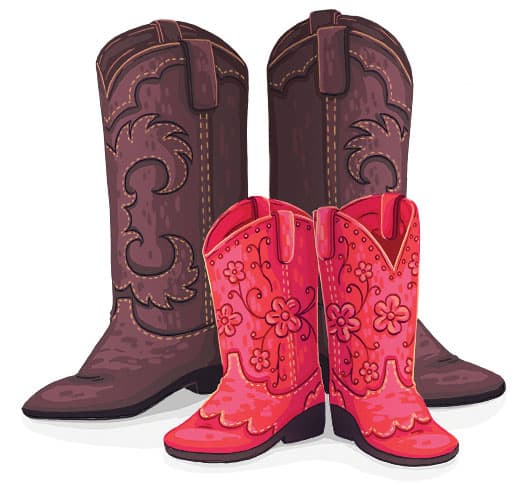WHEN A THIRD GRADER CORRESPONDS WITH A TRUCK DRIVER,
THE WORLD BECOMES A SMALLER PLACE
STORY BY Heather Kirk-Davidoff ILLUSTRATION BY Kelly Miller
When my daughter Rosa was in third grade, she had a Trucker Buddy. Her third grade teacher introduced the program – each child in the classroom would have yearlong pen pal relationships with a professional truck driver – with great fanfare. Each month, each student would write a letter to their Trucker Buddy and he would write them back, sharing news about his travels, his pets and other things that might interest the kids.
According to the Trucker Buddy website, the program’s goal is to enhance “skills in reading, writing, geography, mathematics, social studies and 
Rosa embraced the program with zeal. She committed to memory such information about her Trucker Buddy as the names of his many dogs. She would frequently repeat the phrase he used at the end of each letter, “Always be safe on the road.” When she wrote to her Trucker Buddy telling him that she had received cowboy boots for Christmas, he replied that he also had a pair of cowboy boots. She was thrilled with this connection between her life and his.
The rest of our family found the whole Trucker Buddy idea pretty funny. We wondered what the next “buddy” program would be. Mortician Buddy? IRS Agent Buddy? Crime Scene Investigator Buddy? Why should a group of third graders spend so much time getting to know professional truck drivers?
But after that year, when we saw the big rigs lined up at a rest area on the interstate, we always wondered if Rosa’s Trucker Buddy was in one of them. Truckers weren’t anonymous to us anymore. They had a name and a story. They had dogs and cowboy boots. Building empathy for truckers was not a stated goal of the program, but it is certainly the best thing that happens when people begin to recognize connections between their lives and the lives of strangers.
I was raised in a political family, one that believed in the importance of protests and petitions, letters to the editor and letters to your representatives. I still value these actions. But I’ve come to believe that all change begins with relationship. We think and act and vote differently when we have a personal connection with someone whose life is different from our own.
I’ve seen it happen again and again in the lives of people I know. My congregation prayed for peace in Iraq and Afghanistan, but once some of our own members were deployed there, our prayers took on a new urgency. A pastor I know toed his denomination’s party line about the sin of homosexuality – until his own son came out as gay and the pastor asked himself, “What would Jesus do?” When friends became parents of an autistic child, they became passionate advocates for all children facing such challenges, not just their own son. Autism isn’t just an issue for them. It has a name and face and a story.
People don’t tend to seek out these kinds of relationships. In general, we make friends with people who have similar interests and similar backgrounds to us.
Kids, on the other hand, feel like they have something in common with every other kid around their age. Everyone is a potential friend, regardless of their background, native language or the neighborhood in which they live. And when our kids make friends, they tend to pull us along. We take them to play dates and birthday parties and end up hanging out in the kitchen talking to parents we wouldn’t necessarily have conversed with had we met at a bus stop.
Case in point: My twin sons’ closest friends in kindergarten were their classmate Milton and his older brother, Obed. These two boys were the seventh and eighth of 10 children born to parents who had recently arrived in the U.S. from El Salvador. They lived in a run-down public housing project near the school and Paul and Isaac wanted nothing more than to go home with them after school
I didn’t much like the idea of my 5-year-olds running around the projects unattended, so I went along. I used my rusty Spanish to introduce myself to the boys’ mother and make conversation. She was patient with me – and delighted to have company. By the time the play date was over, we had agreed to meet weekly to exchange language lessons.
We moved away from the neighborhood years ago and have lost track of Milton and Obed’s family. But we think of them often. We put those kids into every news story we read about refugees from Central America. We imagine their bedroom inside every housing project we drive by. We put their names on every kid we see who is growing up in a place we might be afraid to visit. Because we knew Milton and Obed and their family, we feel a connection to everyone who shares their story. We have a stake in their lives. This is how things change.*




